Mathematics
Most of Hampshire's math students find the subject an essential component of their work in other disciplines, but some pursue math for its own sake. Our students engage in a exploratory and collaborative approach, and are encouraged and empowered to use the language and concepts of mathematics in their other work.
Off-campus courses, individual work with Hampshire faculty, the Division II experience, the opportunity to teach, and the Division III independent project contribute to Hampshire having more mathematics graduates who pursue advanced degrees than many colleges of comparable size.
Student Project Titles
- Computational Complexity and Primality Testing
- Connectedness of Randomly Generated Graphs
- Engineering in a Small World
- Mathematical Modeling of Infectious Disease Epidemics
- Mathematics and Western Literature
- Non Euclidean Geometry, Reality, and High School Mathematics
- Math Literacy in American Schools and Society: the Accessibility and Promotion of Math Education
- The Pedagogy of Math Games
Sample First-Year Course
Puzzles and Paradoxes
It has been argued that puzzling is as intrinsic to human nature as humor, language, music, and mathematics. Zeno's paradoxes of motion and the liar and heap paradoxes ("This sentence is false," "Does one grain of sand change a non-heap into a heap?") have challenged thinkers for centuries, and other paradoxes have forced changes in philosophy, scientific thinking, logic, and mathematics. Recreational mathematics will pervade the course, and we'll grapple with irrationality, pigeonholes, infinity, and the fourth dimension. We'll discover, create, classify, share, enjoy, and be frustrated and amazed by lots of visual illusions, as well as mechanical, take-apart, assembly, sequential, jigsaw, word, and logic puzzles. We'll hone our problem-solving skills and consider the pedagogic and social value of puzzles. Armed with examples and experience, we might find some possible answers to "What makes a puzzle 'good'?" and "Why do people puzzle?"
Sample Courses at Hampshire
- Animals, Robots, and Applied Design
- Calculus in Context
- Complex Function Theory
- Computer Animation III
- Computer Music I
- Data Structures
- Economic Development
- Genetic Programming
- Linear Algebra
- Math and other Arts
- Mathematical Biology
- Modern Algebra
- Programming Artificial Life
- Puzzles and Paradoxes
- Structure of Randomness
- What Computers Can't Do
- Statistics
Through the Consortium
- Algorithms (AC)
- Circuit Theory (SC)
- Combinatorics (UM)
- Complex Variables (UM)
- Differential Equations (MHC)
- Discrete Mathematics (AC)
- Electromagnetic Theory (MHC)
- Explorations in Cryptology (MHC)
- Game Theory and Application (AC)
- Mathematical Statistics (MHC)
- Real Analysis
- Valid and Invalid Reasoning (SC)
Facilities and Resources
Five College Consortium
Students at Hampshire have access to the large and active Five College mathematical community, to computer scientists, economists, and other practitioners of the mathematical arts.
Hampshire College Summer Studies in Mathematics Program
The Hampshire College Summer Studies in Mathematics Program is a widely respected intensive program that brings high ability high school students to Hampshire for six weeks to do, share, and enjoy mathematics. College students serve as assistants, participating in seven hours of workshops and problem sessions each day, living in the program dorm, and joining students for meals and recreational activities.



